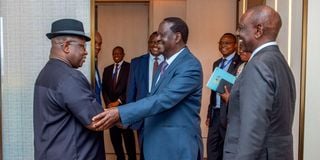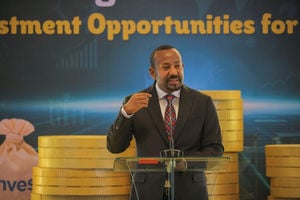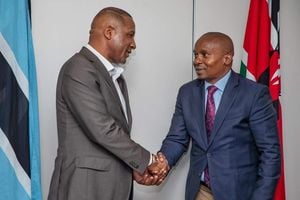
President William Ruto (right), former Prime Minister Raila Odinga, and President Julius Maada Bio of the Republic of Sierra Leone on the sidelines of the World Without Hunger 2024 Conference in Addis Ababa, Ethiopia.
Former Prime Minister Raila Odinga has called on African nations to drop divisive regional labels, terming them remnants of colonial influence, as he promised a better future for the African Union (AU).
Mr Odinga, 79, told a press briefing in Addis Ababa that continual division has contributed to the AU’s inability to make progress, even when it lays down the best written policies.
In the AU’s history, African countries have often been grouped as Anglophone, Francophone or Lusophone, based on their former colonialists, and the language they use in formal communication.
Mr Odinga remembered with nostalgia that these boundaries never existed while he was growing up, or when he lived abroad.
“When Africa was struggling for independence, we were all united as one. Mozambique, for example, would come to Tanzania and be supported. I was taken to Dar-es-Salaam where I got my travel documents to go to Europe,” said Mr Odinga.
“I lived in Europe as a Tanganyikan and Tanzanian before I got my Kenyan passport. Political parties involved in the struggle for independence had their offices in other countries because they were united in their quest. Africa was united at that time,” he said.
“There was no Arab Africa, French Africa or Anglophone Africa. They were all Pan-Africanists and they saw themselves as Africans first. We are Afro-phone,” he added.
The AU was born in 2002 after member states said the old Organisation of African Unity (OAU) needed a rejig from campaigning for the independence of African countries to the prosperity of its people.
The reach of the AU was expanded so that the new organisation could intervene in political crises or even suspend members involved in illegal changes in government.
Elective positions
In reality, though, language divisions still mattered when candidates seek votes for elective positions in the AU — an old habit inherited from the OAU. Language also matters in the implementation of decisions.
Mr Odinga laid out his plan for the AU in Addis Ababa on Friday as the clock ticks down to the February 2025 elections in which he is seeking to become the next African Union Commission chairperson.
In the same vein, Deputy President Kithure Kindiki was in Botswana on Saturday to present the country’s newly sworn in President Duma Boko with a request to back Mr Odinga. The Sadc headquarters is in Botswana.
Mr Odinga has campaigned in east, north, south, central and west Africa. So far, Uganda, Rwanda, Zambia and Ghana have pledged to vote for him. Other countries have been vague, although his campaign teams say there has been a generally positive response as they target an assurance of at least 25 votes.
A candidate needs at least two thirds of the voting members to win in round one. Which is why, even as Mr Odinga criticised the language divisions, he will look at the very linguistic divisions in his vote hunt.
The former PM is banking on votes from eastern Africa, the Southern African Development Community (Sadc) and the Economic Community of West African States (Ecowas) to push his bid through.
Apart from Sadc and Ecowas, Africa has other regional blocs that will be crucial in deciding the winner. There is also the East African Community (EAC), the Community of Sahelian Countries (Censad) and the Arab Maghreb Union.
In an article published in July, Mr Odinga said of the blocs: “While the regional blocs have, over years, promoted good relations among African countries, the integration process on the continent has been hindered largely by inadequate infrastructure — both within and among countries — political instability in some cases, lack of requisite support institutions, and disruptions in regions where member states sometimes experience wars.”
“At the formation of the African Union (AU) from the Organisation of African Union (OAU) in 2002, the eight main regional economic blocs at the time were originally envisaged to form the building blocks of an ultimate Union Government and the United States of Africa,” he added.
Mr Odinga said yesterday in Addis Ababa that his main agenda for Africa is unity and the removal of barriers that have made it difficult for the continent to develop. Those barriers, he said, are also a result of unimplemented decisions.
At the AU, nine in every 10 decisions made are often ignored, delayed or frustrated, according to an internal review seen by the Sunday Nation.
Mr Odinga said that conflicts were detrimental to African nations and could easily be resolved through dialogue and conversation.
The AU has made provisions for dialogue, including use of high-level panels. But new conflicts have been erupting to an overwhelming rates. The continental body has suspended Mali, Burkina Faso, Sudan, Guinea and Gabon for engaging in coups. Sudan has since plunged into war too.
Facing conflicts
“Africa is still facing conflicts despite commitments like the 2020 agreement to silence the guns. Why is this still the case? I think the solution to all these conflicts is dialogue and conversation. Where there is a problem, there is always a solution. The solution is to bring people together to talk and negotiate and come to conclusions,” he added.
Mr Odinga was referring to AU Agenda 2063 Goal of Silencing the Guns. The goal was missed after the deadline passed in 2020. AU extended it to 2030.
The former PM said Africa must negotiate as one to be able to achieve AU’s Agenda 2063, which also includes things like eliminating extreme poverty, archaic habits like FGM and vouching for gender equality.
“We must provide safe spaces for our youth and women and enhance new tech like the AI to provide a window for Africa to leapfrog in development,” he said.
He has also urged Europe to work with African nations to create opportunities for the continent’s rapidly growing youth population, warning that without empowerment, Africa’s young generation could face a bleak future.
“Our youth can be Africa’s greatest asset if we give them the skills and opportunities they need to succeed,” Mr Odinga said. “But without empowerment, they risk becoming a lost generation.”
He also said that he envisions an AU that is united and makes rules that are binding to all member states. Just like the European Union, Mr Odinga argued, the AU should be effective in making policies to promote development.
“Europe was divided with a lot of internal wars, their coming together under the EU has helped them resolve all that and open new ways for development,” said Mr Odinga.
Meanwhile, in Gaborone, Botswana, Prof Kindiki presented President Boko with Kenya’s request to support Mr Odinga’s bid for the AUC role.
The DP held bilateral talks with President Boko, which focused on cooperation in the areas of climate change, tourism, coffee and tea trade, beef, horticulture and floriculture development, mining, cooperative management and regional peace, security and stability.
“There are currently over 1,200 Kenyan citizens living and working in Botswana and the Government of Kenya appreciates the cordial treatment accorded to our professionals who have over time contributed to the establishment of governance and education structures in Botswana,” said Prof Kindiki.
Mr Odinga is running against Djibouti’s foreign minister Mahmoud Ali Youssouf, former Mauritius foreign minister Anil Kumarsingh Gayan and Madagascar’s Richard Randriamandrato.
The fifth chairperson of the AUC to succeed Moussa Faki of Chad will be elected at the February poll. Seven other positions are also up for grabs; the deputy and six commissioners’ posts. Each region will be allocated slots based on the fair “principle of inter-regional rotation”.
The battle for the top seat has narrowed down to Mr Odinga, and Mr Youssouf, 58, have been the busiest on the campaign trail.
However, political analysts say the outcome will depend on every candidate’s ability to build coalitions across regional and linguistic divides within the AU.
Both candidates have made African integration and infrastructure development a priority in their bid to be elected. Mr Youssouf, however, has said he will use private sector participation to implement the African Continental Free Trade Area (AfCTA) to expand intra-African trade, but this will require the rebuilding of infrastructure.
Djibouti’s current foreign minister has also said he will provide responsible leadership at the AU that celebrates diversity and merit while establishing a culture of accountability and transparency.
Additional reporting by Justus Ochieng'




